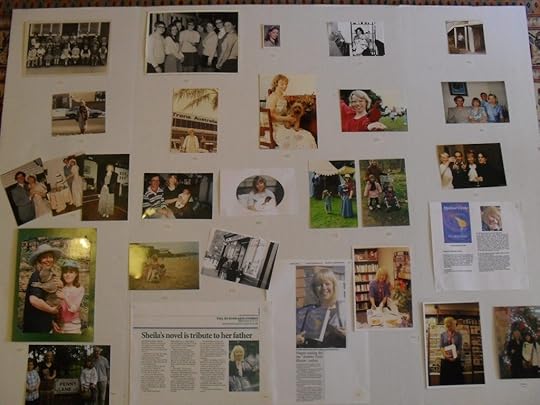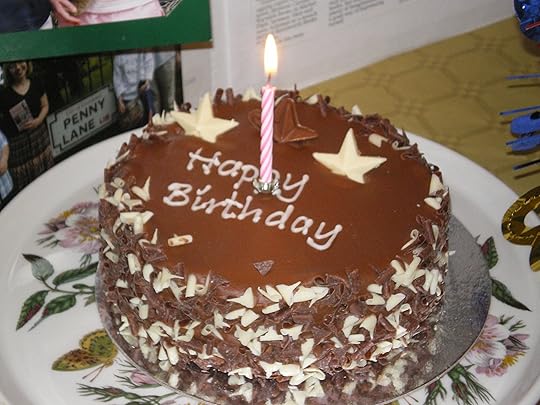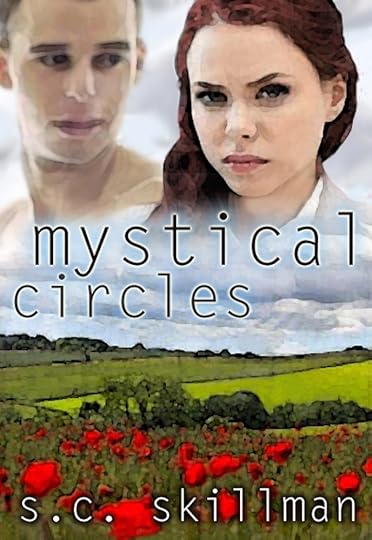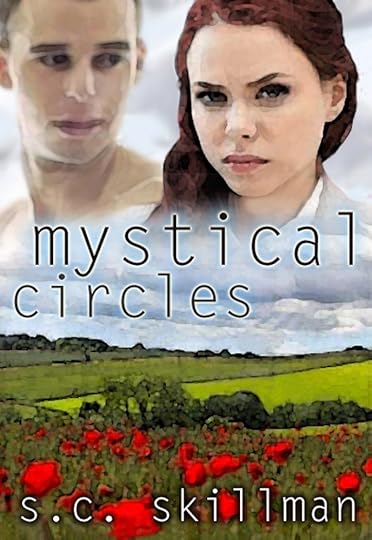S.C. Skillman's Blog, page 66
March 19, 2013
Youth, Time and Soul – Old Photographs & Memories: Coloured Rags or Treasures?
Birthdays and old photographs.

Timeline Photos – birthday celebration – Sheila Skillman
How they arouse our emotions!
So many words have been written about time, and our attitude to it.
Memory is a crazy woman that hoards colored rags and throws away food said Austin O’Malley.
How much is concentrated in this deceptively simple remark: far more than a comment on human fallibility, these words carry a spiritual connotation too.
But I believe an acknowledgement and acceptance of our past is vital to our ability to live in the present and look positively towards the future: and this gives us our sense of belonging.
This weekend I celebrated my birthday (St Patrick’s Day) with two parties, one for my family on Saturday and one for my friends on Sunday – I couldn’t get them all into the house at the same time!

Sheila’s birthday cake
I put a timeline of photos up for guests to see and it was great inspiration for conversation and questions!
One guest said to me (apologies if he reads this blog but I thoroughly empathise with him) , “Oh I never look back at old photos; they make me feel so depressed.”
The truth is I was dreading the task – going back through the photo albums. But I felt impelled to do it, as I believe people do appreciate these displays. I had to psyche myself up to do it, and nearly backed out.
But it was a surprisingly positive thing to do. I looked at photos of a past holiday and felt a wave of happiness. Instead of a sense of loss and nostalgia, I took inside myself all the joy of that time.
Of course, I chose photos of positive occasions, so I admit it was a strongly biassed timeline! School prizegivings, weddings, new babies, anniversary celebrations, holidays. And I realised that I’ve travelled to Australia five times.
I didn’t include photos of Me Making the Worst Mistake of My Life, or a photo of Me Writing the Letter I Wish I’d Never Sent, Which I Regret To This Day, or Me With the Man I Wish I’d Never Met (or got involved with). Oh no. There were no pictures like that on the timeline.
And when it comes to remembrance of things past, I’m only too well aware there are those who have damaging, soul-destroying memories of horror, tragedy and grief – as I see when I read the accounts sent to us by the homelessness charity Centrepoint.
But when it comes to owning good memories, without regret or nostalgia, I feel that way about Australia, where I lived for four and a half years from 1986 to 1990. I eventually came back to England, feeling drawn to my own country again.
Although I miss the subtropical rainforests, mountain lookouts, and mangrove boardwalks, the bellbirds, bougainvillea, and jacaranda trees of Queensland, I don’t feel a sense of loss. Instead I feel they are treasures I always carry with me.
These treasures are vital in creative writing: both the easily-recognized treasures in happy memories and the hidden treasures in our negative experiences too. For a fiction writer, no experience in this life is lost, good or bad.
How do you feel about old photographs? Do you look at them or avoid them? Are old prints lost in forgotten albums? Or have you stored them in electronic files, instantly accessible?
Or are you too busy living in the present? I’d love to hear your thoughts!
Please share in the comments!
Filed under: Australia, British romantic suspense writer, creative writing, empowerment, inspiration, interpersonal relationships, life, love, musings, nature, places I love, places of inspiration, positive thinking, psychology, SC Skillman, SC Skillman Author, spirituality, thoughts, travel, UK, Writing Tagged: a sense of belonging, Australia, birthday, creative writing, fiction writer, happy memories, hidden treasures, I believe that, in this life, memories, negative experiences, old photographs, Queensland, SC Skillman author, spiritual, St Patricks Day, time, timeline photos


March 11, 2013
Shakespeare’s Wronged Women: A Reflection In The Light Of International Women’s Day
The other day I went to a see a production given by Playbox Theatre, held at their local headquarters, Dream Factory, Warwick.

Alice Woodhouse in Shakespeare’s Wronged Women (copyright Kenilworth Weekly News)
There we saw members of the Shakespeare Young Company present to us “Shakespeare’s Wronged Women”.
In the words of Stewart McGill & Mary King, the Artistic Directors of this company, “Having explored with SYC the torments of The Winter’s Tale, in parallel we were discovering the wronged natured of many of Shakespeare’s heroines. It seemed a catalogue was emerging whereby the women in the plays were victims of male power, greed, status and political actions, not to mention infidelity and sexual domination. From Juliet and Hermia across the canon to Queen Katherine in Henry VIII these women demanded to be heard.”
After listening and watching the young people acting the roles of these wronged women, (among whom I may single out Alice Woodhouse as Hermione in A Winter’s Tale, and Mairi Ella Challen as Rosalind in As You Like It for their superb acting) I reflected: What do they all have in common? All these wronged women, as Shakespeare portrays them?
It’s this – they all inherently know their own self-worth.
They all know they deserve better.
Shakespeare gives them a voice. They express themselves powerfully, eloquently, passionately.
They won’t necessarily succeed, in worldly terms, because they are up against the brutish force of power politics and superior physical strength and sexual violence.
But their voices ring out.
The young actors, (I later speculated) perhaps thought this:
This will never happen to me.
I will never get myself into this situation.
I would never let anyone treat me like this.
I would never make this mistake.
But in years to come, maybe they will remember those impassioned words – from Kate in The Taming of the Shrew, from Hero in Much Ado About Nothing, from Juliet, or from Helena in A Midsummer Night’s Dream.
International Women’s Day was necessary because there are many women in this world who also have the same value and worth, but are not able to express themselves powerfully, eloquently, passionately.
And may they, and all the oppressed women for whom International Women’s Day was first created, know their own worth and live it out and fully possess it.
Filed under: Authors I love, Books, creative writing, culture, empowerment, inspiration, interpersonal relationships, life, literature, love, musings, people of inspiration, positive thinking, SC Skillman, SC Skillman Author, stage drama, thoughts, UK, Writing Tagged: Dream Factory Warwick, International Womens Day, Playbox, SC Skillman author, Shakespeares wronged women, youth theatre


March 8, 2013
International Women’s Day 2013 in Leamington Spa – Women and Girls, Come and Support the Cause!
I shall be selling signed copies of “Mystical Circles” at the International Women’s Day event at The Sydni Centre, Leamington Spa, this afternoon (Friday 8 March 2013).
You can find The Sydni Centre here.

Mystical Circles by SC Skillman
This is a Women and girls only event, held at the SYDNI centre – ALL WELCOME 0-90 – bring your daughters mothers sisters – range of activities and events – live music, singing, dance, self defence, arts workshops, CommunityPhilosophy, discussions, films, food – please come and celebrate the day with us! Free!
Supported by local women, various agencies voluntary & statutory.
The event is from 4-8pm. Do drop in if you’re in the area at that time!
Filed under: Books, British romantic suspense writer, creative writing, empowerment, literature, Mystical Circles, people of inspiration, romantic suspense, romantic suspense fiction, SC Skillman, SC Skillman Author, UK, Writing Tagged: International Women's Day 2013, Leamington Spa, mystical circles, SC Skillman author


March 4, 2013
Jennifer Lawrence, Young Success, and The Gift of The Present Moment
Picture this. who has won an Oscar, is asked at her press conference: “You’re awfully young to have so much success so far. Do you feel it’s a good thing? You’re not worried about peaking too soon?”

Jennifer Lawrence, winner of best actress award at 2013 Oscars (photo credit CalgaryHerald)
What can she do, but smile, give a baffled grimace and say, “Well, now I am.”
Fortunately, this did bring much laughter, as did her answers to other questions. When I watched this, I thought Jennifer may well have wished she was being questioned by Caesar Flickerman instead.
But this enquiry to the actress who played Katniss in The Hunger Games and has now won as Oscar for her performance in Silver Linings Playbook led me on to these reflections:
How can a young person ever feel they’ve ‘peaked too soon’?
What is she to say? “Oh yes. I’m terrified I’m going to suffer burnout at 30.”
For Jennifer Lawrence, as with any talented, creative young person in a similar position, the recognition she has already received is simply something that has happened to her, which is good, and which she receives with pleasure.
“Peaking too early” and “burnout” are concepts only people with decades of experience in this life can ever grasp.
Many writers and philosophers have spoken on the subject of time.
Here’s one for both Jennifer Lawrence, and the hapless journalist who questioned her:
Yesterday is history, tomorrow is a mystery, today is a gift of God; which is why we call it the present (Bil Keane).
Filed under: About Books I love, Books, life, media, movies, musings, psychology, SC Skillman, SC Skillman Author Tagged: actress, best actress award 2013 Oscars, Bil Keane, burnout, gift of God, gift of the present moment, in this life, Jennifer Lawrence, Oscar, peaked too soon, SC Skillman author, success, time


February 26, 2013
The Lovely Bones Movie – New Insight Onto a Terrifying Subject
What could be worse than losing someone you love through untimely death?

Poster for The Lovely Bones movie
And what could be even worse than that?
Losing them through murder.
And then worse than that?
Just imagine – the person you love, who is murdered, is a child, with all life and hope ahead of them.
This is the nightmare scenario for many parents.
And I would share those feelings absolutely. For this reason, when I first read about Alice Sebold’s novel The Lovely Bones it immediately struck me as a novel to avoid reading.
But I watched The Lovely Bones movie on DVD recently.
Why, you may ask? The reason was because my teenage daughter wanted to see it. She’d seen a trailer and found it appealing; she likes the young star of the movie, actress and her friend had recommended her to see it.
So I added it to my “LoveFilm” list and it duly arrived a few days ago.
The Lovely Bones by Alice Sebold was a book which has elicited very mixed responses. Although we are told “it received much critical praise and became an instant bestseller” on its publication in 2002, nevertheless I have spoken to people who have described it as “depressing”.
A young girl is raped and murdered by a serial killer and watches her family fall apart, from limbo.
From my point of view, as a romantic suspense author, I thought this a painful and difficult subject to handle in a novel.
Yet upon watching the movie I was totally captivated. The delicacy and beauty and wisdom with which the subject was handled reversed all my expectations.
Without reading the novel, I had thought the premise of the story essentially flawed. Firstly, telling people in this situation to ‘move on’ for its own sake, seems specious. Evidence tells us that in such cases victims above all desire justice – and until they have seen justice to be done, they cannot ‘move on’.
Secondly, to my mind, telling the story from the viewpoint of a murdered child in limbo, seemed to me a device that changes the subject in an artificial way right from the beginning. In this life, any such tragedy would be instantly rendered less agonizing if you knew for sure the lost person was in fact very close to you, present with you, and also in heaven. And of course the idea of wandering around in “limbo” as part of the post-death spiritual journey, is derived from Catholic tradition, and one of the explanations popularly given for ghosts.
I believe that in real life we never do have such immediate and uncontrovertible assurance – with or without religious faith.
So I thought it a very dubious quasi-spiritual approach to such a theme. And yet, in the hands of a skilled director – in this case, Peter Jackson – a book can be turned into a movie where these difficulties recede, and another message comes through.
In some respects, the subject invites comparison with the book The Shack.
In this book, too, a young girl is lured to a ‘killing place’ and murdered. The story follows the reaction of Missy’s father to this tragedy, and moves on into an exploration of God which, I dare to believe, hs the power to transform our habitual attitudes.
I felt that in each story a device of separation is used: defamiliarisation. It seems that some of the worst experiences in life can only be truly understood from a distance. This has long formed part of the genres of mystery and imagination.
This was well underscored by the music – slow, languorous and dreamlike behind the “In-between world” and edgy clanging discordant notes as the murderer starts to saw wood and construct his next killing den. The visual effects too were very powerful; shadows moving across rays of light “in the blue horizon between heaven and earth” like images in dreams, and the creepy dismal gloom of the world of grief which the family inhabit, with the father’s initial denial and continuous refusal to let go. Very striking too was the silence behind the murderer as the blackness slides aside to reveal him sitting in his house.
The words “I knew then even though he loved me he had to let me go “ restate the theme, as do the words, “I begin to see thing in a way that let me hold the world without me in it.”
Have you seen the movie? Do you believe that a flawed premise in a novel can be transformed by a movie director? Please share your own thoughts, on this, or on the issues it raises.
Filed under: Books, creative writing, life, literature, love, media, movies, musings, SC Skillman, SC Skillman Author, spirituality, thoughts, Writing Tagged: Alice Sebold, dare to believe, do you believe, dreams images, I believe that, mystery and imagination, Peter Jackson, romantic suspense, SC Skillman author, spiritual, The Lovely Bones movie, the spiritual journey, this life


February 21, 2013
Take a Look at My Author Interview on Rebeccah Giltrow’s Blog
Hi everyone!

Mystical Circles cover image
Another kind blogger has just published an Author Interview with me. You may like to take a look at the interview here.
Many thanks to Rebeccah Giltrow for giving me this opportunity!
Filed under: Books, British, British romantic suspense writer, creative writing, life, literature, Mystical Circles, romantic suspense, romantic suspense fiction, SC Skillman, SC Skillman Author, UK, Writing Tagged: mystical circles, Rebecca Giltrow blog, romantic suspense fiction, SC Skillman author, SC Skillman author interview


March 19, 2012
Literary Criticism, Joseph Conrad Corns and Jane Austen's Irony
A friend recently asked me this question on behalf of her daughter, an Eng Lit A level student: "How do you analyse a novel?" And I tried to be helpful… but what strikes me most about literary criticism is that even though you may analyse a novel on many levels, according to the personal preference of the analyst, none of it may bear any resemblance to the author's original intention.
I am taken back to my university days; and both Jane Austen and Joseph Conrad rise up before my mind's eye. What is all this about Jane Austen? What is there in her? What is it all about? " wrote Joseph Conrad to HG. Wells in 1902. (See Claire Harman's website for more on this!)
I recall my first Eng Lit seminar at university. Before us was Jane Austen's novel Emma which we'd all been asked to read during the vacation. Our tutor opened by asking, "Does anybody here actually like Jane Austen?" Silence met this question. Then I foolishly said, "Yes." "Why?" he shot at me. "Her use of irony," I said. "Read me a passage from the book which demonstrates her use of irony," he said. The spotlight was on me. My mind blanked. I flipped through the book, totally unprepared, panicking. "All of it is ironic," I said.
At that time I was naive and unprepared for the kind of critical thinking university study requires of you. I soon became more streetwise, but even so there was no way to avoid being caught out. Another tutor opened a seminar with the words: "Today we are going to look at Sylvia Plath as victim and product of society." Later on in the discussion, he targeted me with the words, "And what about you, Sheila? Surely this relates to your earlier theme, doesn't it?" And I couldn't remember what my earlier theme was.
The final word goes to a third tutor (a world authority on Joseph Conrad with a long list of acclaimed publications behind him) who walked into a seminar room where we sat with Heart of Darkness and The Secreta Agent before us: "Now, come on; who's going to step on my Joseph Conrad corns?" Later we considered Conrad's motif of overweight villains. In The Secret Agent we read that Mr Verloc is: "… fat – the animal." "What a horrifying vision of humanity," mused our tutor. "I must slim."
Filed under: Books Tagged: analyse novel, analyse novels, conscious intention of author, critical thinking, Eng Lit, English Literature, Jane Austen, Joseph Conrad, literary criticism, meaning of a novel, Norman Mailer, SC Skillman, seminar, Sylvia Plath, University








March 15, 2012
Favour, privilege, and royal fairy dust
My son mentioned to me that he had learned from Newsround that Garry Barlow of Take That had asked Prince Harry to sing a line in one of their songs. And that Harry had (so far) refused. This led to thoughts about royal power and privilege; especially as I later watched the excellent TV programme "She-Wolves" presented by Helen Castor, the author of a book of the same name. Only a cursory study of the Plantaganets is needed to remind us that the history of the English monarchy is bloody and turbulent. It is inconceivable these days that a royal figure (in this country) would dare to be seen favouring someone for their personal benefit. And then I arrived at the most interesting element of this: that we have developed a culture which incentivises royalty to behave in this way. Royal fairy dust cannot be seen to create personal privilege. Our royal family is truly accountable to the people.
In former times wealth, power and success was in the gift of the monarch. If you fought for the right person, and he won, and got his hands on the throne, you could benefit richly from it – perhaps an estate or a substantial parcel of land, or a magnificent property… And thus we have the stately homes that scatter this country, to our enjoyment, many of which have fallen safely into the care of the National Trust: the fruits of royal privilege, returned to the people.
And so back to the question whether Prince Harry will agree to make a musical contribution to Gary Barlow's Diamond Jubilee song… who knows? But I suspect the answer will remain a courteous and good-humoured "No."
Filed under: Books, culture, history, media Tagged: culture of our nation, Diamond Jubilee, English monarchy, Gary Barlow, Helen Castor, National Trust, Plantaganets, Prince Harry, royal favour, royal privilege, stately homes of England, Take That








March 12, 2012
How Do You Write About a Character's Thoughts?
This was the question my teenage daughter posed when I said: "Ask me any question about writing novels. What would you like to know?" So I replied, "Put it in italics." But I hasten to add that I don't think that was the answer she wanted. Nor do I believe it really does provide the solution. So I'll just try and unpack what I think she meant.
There are of course, at a superficial level, 'different ways to write people's thoughts'. The author tells you what the character thinks; or the thoughts are given directly in italics; or the novel is written in first person narration and gives thoughts direct to the reader. Certainly, novels which have directly conveyed the character's thoughts are most powerful, and they haunt my memory. Among them is John Fowles The Collector. Indeed, this is a terrifying example. Here we are taken by the hand and led into the world of a first person narrator who is criminally insane. We are inside his head. And of one thing we can be sure: we wouldn't like to be at his mercy, or meet him down a dark alley. The second part of the book is told through the viewpoint of his victim. This is a stunningly successful device. With novels like this, any kind of value judgement by the reader is cancelled. I read the book in a state of concentrated attention that was devoid of any sort of "background chatter". I had a similar experience when I read Wladyslaw Szpilman's memoir of survival in Warsaw 1939-45, The Pianist. There are some stories which are so razor-sharp and the events so stark that descriptions of emotion or on-the-spot evaluation by the first person narrator are redundant. A third example can be seen in Susan Hill's The Various Haunts of Men when she takes us inside the mind-set of the killer. Again no judgement is placed upon this by the author; it's unnecessary. His chilling worldview alone makes its impact, alongside our knowledge of the various deceptive roles he plays in society, for the benefit of his victims.
Ultimately the answer to my daughter's question is: be scrupulous, sparing and self-disciplined in the way you show your viewpoint character's thoughts. It's a difficult lesson to learn. Over-indulgence is a sure sign of amateurism. And it's a lesson all but the most brilliant writers never stop learning.
Filed under: Books, Writing Tagged: brilliant writers, character's thoughts, first person narration, SC Skillman, viewpoint, writers, writing novels








March 8, 2012
Water, Rock, Moon and Ancient Stone

Morton Bagot Church, Warwickshire
Imagine the Warwickshire countryside in silence and darkness. A rabbit running from the headlights. Imagine a radiant moon and bright stars. The fresh rich smell of silage in the night. A tiny ancient church on a hill, lit only by candles within. Imagine rocks, water, Celtic prayers and songs – and you'll know what I was doing last night.
Within the church with its rough stone walls are tall candlesticks and centuries-old choir stalls and pews. And a small group of people with torches.
We were there with our leader, Annie Heppenstall , to commemorate the life of St Non, Celtic saint - the mother of St David, patron saint of Wales. St David's Day is 1st March, and St Non's Day is 3rd March. To celebrate the highlights of the Celtic calendar in a special place like the church at Morton Bagot recalls the Celtic idea of "a thin place" – a place where the veil between heaven and earth is thin. I've written of this before in my blog post about Sacred Spaces. Many of us can name special places throughout the British Isles which we have felt to be "a thin place." And this tiny church on the hill is one of them.
St Non of Wales presents, in common with many saints, an example of a life which encountered trauma yet overcame. She was an educated woman who chose to devote herself to life as a nun; raped by a prince of the region, she gave birth alone on a clifftop in a raging storm. When the child she bore grew old enough she entrusted him to the church for his upbringing as many did in those days and resumed her life as a nun. Her son grew to become a holy man himself, and we know him as St David.
For us today, the example of St Non is one of a woman who suffered, lived through trauma and crisis, and triumphed over a bad situation, coming out the other side, working faithfully with her changed circumstances and then courageously taking up her path again. On the site in Pembrokeshire where Non gave birth, to this day, a pure spring of water flows out from the bedrock where many have come to pray for healing.
SC Skillman
Filed under: faith, history Tagged: anicent church, Annie Heppenstall, Celtic calendar, Celtic saint, Morton Bagot church, Pembrokeshire, sacred spaces, SC Skillman, St David, St Non of Wales, thin place











